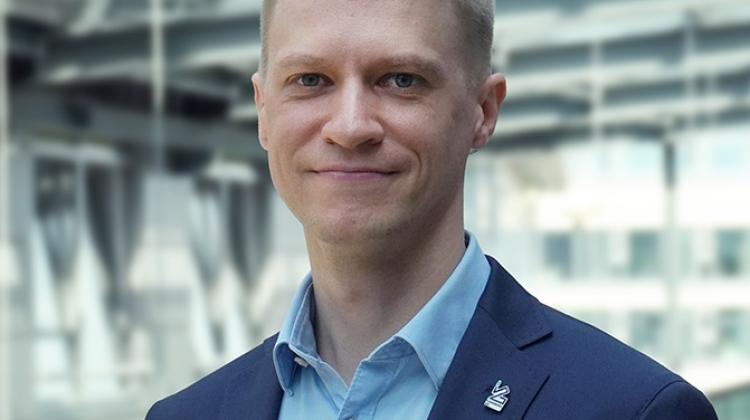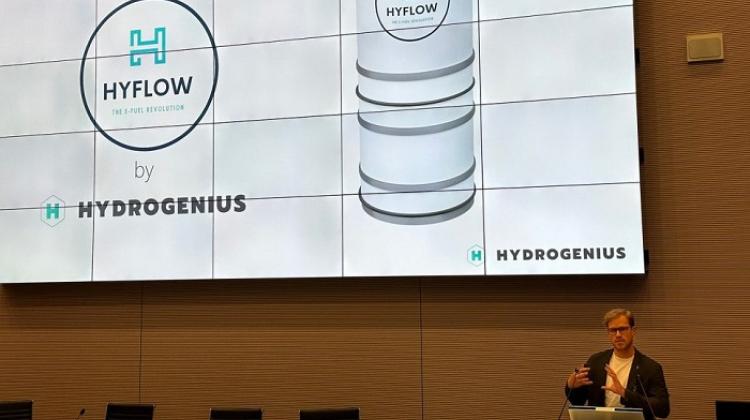Technology is increasingly stressful for people, says psychologist
 08.12.2023. Konrad Maj, a social psychologist. PAP/Marcin Obara
08.12.2023. Konrad Maj, a social psychologist. PAP/Marcin Obara
‘More and more people are affected by the so-called technostress. It has various aspects - from the abundance of terrifying news and the pressure of having the latest gadgets, to social isolation, digital exclusion and fear of the future. It will probably get worse,’ Dr. Konrad Maj from SWPS University tells the Polish Press Agency (PAP).
Dr. Konrad Maj is the head of the HumanTech Center for Social and Technological Innovation and assistant professor at the Department of Social Psychology at the Faculty of Psychology, SPWS University in Warsaw. He is primarily interested in issues related to new technologies, among them: artificial intelligence and the metaverse, including their impact on social and psychological processes. In his research, he deals with the interactions of people and robots.
PAP: Technology is developing faster and faster. In your opinion, in terms of mental well-being, do people live better thanks to it - or do they lose out on it?
K.M: It is impossible to assess it so clearly. Much has been said, for example, about the disastrous impact of smartphones. But they give us constant access to the Internet, we can check many things and deal with many matters with a single click. We can also document our lives by taking photos and recording videos. Unfortunately, the attractiveness of these devices is a trap for many people. We reach for the phone every six minutes, the average Pole spends about six hours a day on the phone and this number continues to increase. Because we have access to so much information and so many functions in one place, we cannot do without it. You could say that we lose a third of our lives because of it. Moreover, a smartphone is a status symbol, it offers 'access to the world', but we pay for it with our time. We are constantly waiting for the next incarnations of various products - a better phone, a better TV or car, and we don't even wonder whether we need them.
PAP: Exactly. In the past, a person would buy one TV every few years, then a computer, and today you have to update your TV, computers, phones, smartwatches, VR goggles... It is hard to keep up.
K.M: This applies especially to young people who tend to compare themselves with others and often base their self-esteem on what new things they have, whether they are up to date, whether they have something to be proud of. It all costs money, so some people end up in debt. At the same time, such novelties bring joy for a short time, because in a moment someone else will have something newer, more expensive. Such competition is exhausting. Besides, the latest models of various devices are usually not needed at all. They may have a lot of options that the owner will not use. For example, in the case of televisions, 90 percent of users use only their basic functions. For some people, buying new items is also a way to boost their self-esteem. Some people treat electronics stores a bit like psychotherapy offices - when they feel bad, they buy a new thing. It is very easy, and the marketing strongly encourages purchases. However, this is not a long-term solution.
This is because the assumption that technology will make us happy is disastrous and false. This is the so-called technological solutionism, about which Evgeny Morozov, a scientist and writer born in Belarus and living in the USA, wrote in his book. In his opinion, we have an exaggerated belief that there is a technological solution to every problem. This an overload of technology.
PAP: Being surrounded by gadgets probably contributes to another problem - information overload.
K.M: Indeed it does. We are talking about information overload, analogous to the term 'urban overload', which was coined by Stanley Milgram in the 1970s. Now something else is treated as the main source of burden on the human psyche.
We are overloaded with information and electronic stimuli. In the past, people looked for information, today it is the opposite - information looks for people. We watch less TV, but that does not solve anything - we have moved to the small phone screen. Information for mobile purposes is condensed, shortened and deliberately coloured to attract and hold our attention.
For many people, the smartphone has become synonymous with various errands and responsibilities. It distracts us even when it is turned off. According to research, we check our phones on average every six minutes, and it constantly sends various alerts. We are constantly distracted, and this cannot have good consequences. This was well demonstrated by a simple experiment. A group of volunteers were asked to perform an intellectual task. Some people had a working phone in their pocket, some had their phones turned off, and some left phones in another room. It turned out that the group working without phones had the best results.
Our brain needs to focus, delve into a matter, operate at a deeper level. We also need deeper conversations, as well as other activities that are natural to us - various forms of movement, dancing or singing. Instead, we feed ourselves with activities that are not natural for us, which makes us tired. We forget about healthy ways of relaxation, for example, instead of contact with nature, we browse photos or other content.
PAP: And the materials on the Internet vary in quality. How much does that matter?
K.M: Today, almost all of us have become, in a sense, creators, publishing various things online. And everyone is fighting for audiences in one way or another. For this reason, we compare ourselves with others, seeing who has it better and who has it worse. This can cause severe stress, sadness and irritability. Moreover, various websites compete for viewers and readers, often using fear to attract them. This means that we are more afraid. In addition, there is the problem of fake news, which often causes a stir. Today, almost anything can be generated with the help of AI, and it is often difficult to verify the information. As a result, a highly stressful environment is created on the Internet. We try to deal with it somehow - many people reject social media, but then often come back to it because they lack access to valuable, important information that can also be found there. We also cannot do without social media platforms for professional or promotional reasons. So we are stuck in a kind of trap.
PAP: You have to learn how to use digital devices. Not everyone wants to do it, and not everyone feels up to it, which may be especially true for older people. Can such exclusion also cause stress?
K.M: Certainly. This is the other side of the coin. Some people have too much contact with technology, others feel completely excluded from it. This is often age-related, because more and more solutions are addressed to young people and older people sometimes cannot keep up. They may feel some anxiety about this. They may believe that they can't do enough, that they are too old. Being constantly online is destructive, but being away from the digital world is also destructive. And this dilemma is also a burden for us.
PAP: High popularity on the Internet can be accompanied by real loneliness, correct?
K.M: People often focus on quantity and collect virtual friendships because it confirms their popularity. Some are followed by thousands or even millions of people. However, when we exchange information with people digitally, we only have a false sense of contact. We think we know what is going on with someone and that is enough. However, even 100 contacts a day will not replace one deep interaction. Brief communication, asynchronous and full of emoticons, when we write something to someone and get a response after some time, is not high-quality contact.
Research shows that during live meetings, many hormones are released in the human body, which is missing even during video calls. I would say that we are still not prepared to live in a world so full of technology. The problem is that we are usually not aware of it. This can be seen every day when people spend almost every free moment with a phone in their hand, whether in a queue in a store, in the toilet or in the waiting room. Moreover, various screens are increasingly replacing people - e.g. in stores or at airports. The world is moving towards contactlessness. We begin to lack emotional connections with other people, and we are social and emotional beings. Without real social contacts, it is impossible to build bonds, and without them it is impossible to maintain mental health.
All this may contribute to the sad statistics regarding young suicides. In 2022, there were over 2,000 suicides among young people. That is six times more than 10 years ago. Young people do not learn healthy communication; they don't know how to get help when problems pile up. At the same time, social media, movies and games only give temporary positive feelings, so the person using them feels lost. In addition to the benefits that technology brings, it often creates a barrier against other people.
PAP: What else threatens the human psyche due to immersion in the world of technology?
K.M: In the 1980s, Alvin Toffler talked about future shock - stress caused by fear of how technology will start to change the world. This is especially true in our times. Nowadays, in times of rapid development of artificial intelligence, people are wondering, for example, whether their profession will disappear when they graduate, what they should learn, what to invest in, whether they will have a job, whether they can start a family. This causes tension. Should we just wait - or do something to prepare? It is hard to predict anything. We live in a time of great uncertainty.
PAP: How do you see the future in this context? Are you optimistic or just the opposite?
K.M: I would describe myself as a moderate pessimist. Firstly, because we do not really see a way back from the technological framework of the world in which we operate. Even though we may become aware of certain things, even though social media-free movements are emerging, even though there are people who do not have a TV or look for respite in nature - most people do not have this type of awareness. What's more: we don't have time for reflection when technology fascinates us and keeps promising us something. And all this because we are fascinated by human thought and creativity.
Unfortunately, however, the negative consequences of technological progress are too rarely discussed. All innovations are promoted and huge funds are available for them. Not only are threats not taught in schools, decision-makers also do not read what scientists or publicists such as Ronald Wright, Francis Fukuyama or Juwal Noach Harari have to say. That's why I am glad we could talk about it. (PAP).
Marek Matacz
mat/ zan/ kap/
tr. RL
Przed dodaniem komentarza prosimy o zapoznanie z Regulaminem forum serwisu Nauka w Polsce.



















